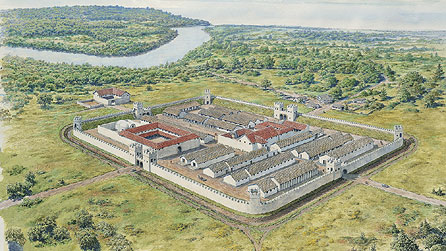Romans in Nineteenth Century Wales?! March 15, 2016
Author: Beach Combing | in : Ancient, Medieval, Modern , trackback
There is lots of enjoyable nonsense about the Welsh and the Romans. The medieval Welsh genealogies are full of supposed Welsh connections to Caesar and other luminaries of the Empire. If memory serves correctly Gerald of Wales claims that the Welsh of his time sported Roman hairstyles (or was it their clean beardless faces that were Roman?). Then even modern supporters have chipped in. That great Anglo-Saxonist, James Campbell (who once did this blogger a notable kindness in a bad hour) wrote with superb hyperbole that ‘It took until 1282, when Edward I conquered Gwynedd [north-western Wales], for the last part of Roman Britain to fall. Indeed a strong case can be made for Gwynedd as the very last part of the entire Roman Empire, east and west, to fall to the barbarians.’ Of course, all this would have been news for the Roman legionaries occupying the Brecon Beacons or Mon c. 300 AD, who found themselves in tribal Celtic societies that seem to have had precious little interest in the culture of their imperial Latin masters.
Beach, in any case, lately run across a bit more Roman-Welsh madness that he wanted to share. It starts undramatically with some ‘racial’ observations of the kind that the Europeans of a century and two centuries ago loved.
I have, however, myself observed Roman features in the peasantry at Caer Sws, the site of a large Roman [?!] town between Newtown and Llanidloes, six miles from any existing town, wholly at variance with those of the surrounding Welsh. Apart, however, from these mere fragmentary remnants of that great people, I believe the Romans left nothing behind them but the architectural relics of their art, and the palsying influence of their luxuries. [Arch Cam 1854]
However, much more interesting is the naming history of a southern Welsh parish.
Many of the inhabitants of the parish of Conwyl Gaio, between Llandovery and Lampeter, near Dolaucothi, (the residence of John Johnes, Esq., County Court Judge for Pembrokeshire, &c.,) consider themselves as the descendants of a Roman colony. Many of them pride themselves on their Roman descent; and Roman names are extremely prevalent among them. There is a person now living (1818) who bears the name of Paulinus; but the modern Paulinus, instead of commanding armies, works as a day-labourer, and lives contentedly in a cottage. The name Conwyl Gaio, or Cynvyl Gayo, has been supposed to mean ‘the advanced host of Caius’ [Cambrian Register, vol. iii].
If this was just a theory on the part of an antiquarian it would be one thing, but the author writes: ‘Many of the inhabitants of the parish of Conwyl Gaio… consider themselves as the descendants of a Roman colony. Many of them pride themselves on their Roman descent…’ Where did this unlikely Roman identity come from? Can we learn anything else about it? Drbeachcombing AT yahoo DOT com
28 Mar 2016: Chris S has a bit of fun with philology: Speaking as laity, I’m going to make a wild-assed guess about the origin of the name Caer Sws. It’s pronounced, roughly, as Kairsus, putting me in mind of Kaiser. Kaiser is the German word for emperor, like czar, its etymology harkens to Caesar. Another Caesar connection with Caer Sws is Gaius. Living in New Jersey, I’ll hear Italian-Americans talking about eating “gabagool” which is spelled “capricola”. For whatever reason, contemporary Romans and southern Italians freely exchange voiceless velar stops (k) with voiced velar stops (g). My suggestion is Caer Sws is referencing Gaius, with syllables and terms being pidgin-ized. Caersws means “Fort Kiss”, a strange name for a military outpost! Caer means “fort”, presumably with caer deriving from cairn meaning a pile of stones. According to ‘”Mediomanum?” at Roman Britain’ – http://www.roman-britain.org/places/caersws.htm, the “sws” derives from another source, presumably Roman. In short, Caersws meaning “Fort Kiss” may be a case where Latin was serendipitous with the Welsh language. Much like Coca Cola, when pronounced in Chinese, means “To Allow The Mouth To Be Able To Rejoice” (可口可乐, K’o K’ou K’o Lê). Caersws may have been named for Rome’s emperor, but over the years the origins were forgotten and locals felt calling the place Fort Kiss was good enough since that’s what it sounded like to them.
28 Mar 2016: LTM points out the proximity of the Romans Dolaucothi Gold Mines…


